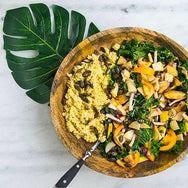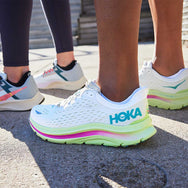By Linia Patel
Growing up ain’t easy. Whether you are a bright eyed, bushy tailed grad starting out on your first job or if you’re well established in your career or doing the career–and-children juggling act or even if you’re beginning to prepare for retirement – all stages of life have their curve balls and surprises. However, two things are for certain. The first is that ageing is inevitable. The second is that life moves by pretty fast. Nothing stays the same for long and sometimes it can feel hard to keep up. And the same goes for health and fitness too… How do you adapt? How do you keep up the awesome even as you age?

Spoiler alert -- move more (see point #5 below)! Seen here: crop & leggings by SALT.
The Science Behind Ageing
An exciting new area of anti-ageing research is linked to telomeres. Telomeres are segments of DNA at the end of your chromosomes – like the plastic tips at the end of your shoelaces that keep your laces together. At the beginning of your life you have 15,000 to 35,000 pairs of telomeres linked to the end of each chromosome in your body. As you age, your telomeres decrease in number (unfortunately, ladies... there is another biological clock!). Your telomeres also become shorter and shorter. Their shortening process and the inability of your DNA to replicate itself properly (i.e. when there are only about 4000 pairs of telemores) is linked with ageing, development of diseases like cancer and of course a higher risk of death (1).
While science still isn’t 100 percent sure how telomere length affects how you age yet, what is clear that the longer your telomeres, the longer your lifespan but more importantly the better quality of health as you age (2).
How to Beat the Clock
I’ve put together quick guide to your best healthy habits so that you can stay on top of your telomere game and in turn be a “younger” you.
1. Control and reduce chronic stress.
Worrying does give you wrinkles and there is research to prove it! The reason for this is that when you are stressed, your body has a fight or flight reaction that releases stress hormones like cortisol and adrenaline. The body is very good at handling short-term acute stresses; however, the problem with our go-go-go 21st century lives is that our bodies are pumping out stress hormones almost constantly and this is not good news. A recent study looking into the impact of work-related stress and telomere length found that individuals the reported the most job stress had the shortest telomeres (3). Shortening of telomeres = accelerated biological age.
Practical Tips
- Eat within the first two hours of waking. Eat a breakfast that is a mix of lean protein, good carbs and healthy fats
- Keep intake refined carbs and sugar in check
- Curb the caffeine habit (2-3 coffees and teas max a day)
- Consider popping a fish oil tablet
- Use exercise to de-stress – not booze
- Practice mindfulness and meditation

Ahhh... sweet coffee. Try to keep it to 2-3 cups a day max to stay looking youthful! (Photo)
2. Get your antioxidant fix
Colourful vegetables and fruits such as dark green leafy vegetables, bright red tomatoes, deep purple berries and orange butternut squash are bursting with vital plant based nutrients called antioxidants. Antioxidants neutralize harmful free radicals in your body. Harmful free radicals exist everywhere in our environment, but they are concentrated in pollution, chemicals, radiation, pesticides, alcohol, drugs, unhealthy food and even sunshine. Antioxidants are believed to protect your telomeres by helping stop free radicals from damaging cell (a process called oxidative stress). However, studies have shown that supplements are not able to mimic all the health benefits of eating the whole foods (4).
Practical Tips
- As a general rule, the richer the colour of the fruit or vegetable, the more antioxidants it contains
- Fill half of your plate with different coloured vegetables and fruit at each meal
3. Top up on the sunshine vitamin (aka vit D)
A recent King's College London study of more than 2,000 women between the ages of 18 and 89 found those with higher vitamin D levels showed fewer ageing-related changes in their DNA. After adjusting the results for the age of study participants, findings showed that women with higher levels of vitamin D were more likely to have longer telomeres in these cells, and vice versa. Another study looking at the vitamin D and inflammation (another promoter of ageing) found that those with higher vitamin D levels had lower levels if inflammation. Vitamin D is known to be a potent inhibitor of your body's inflammatory response which means it protects your body from the deterioration of aging (5, 9).
Practical Tips
- To maximise vitamin D absorption, get in the sunshine (without any sunscreen) for at least 20 minutes per day from 10 – 4pm in the summer months. That said, of course you still need to be practicing safe sun exposure
- During the autumn and winter months begin to take a vitamin D3 supplement or invest in phototherapy
- If you want to know what your vitamin D levels are, ask your GP to check your blood levels
4. Dabble with intermittent fasting
There is an increasing host of research showing that intermittent fasting may be in fact be an effective strategy for slowing the ageing process. Animal research has shown calorie restriction of up to 40 percent fewer calories than normal to have an impressive positive effect on disease, markers of aging and life span (6). The results from a pilot study in humans (Comprehensive Assessment of Long-term Effects of Reducing Intake of Energy (CALERIE)) also showed that overweight adults who cut their calorie consumption by 20 to 30 percent lowered their fasting insulin levels and core body temperature. Both of these changes gave been linked to increased longevity in animal models. The lower calorie intake also reduced their risk for major causes of mortality such as heart disease and diabetes (7). There is still more research needed to fully understand the long term impact, but these initial results are certainly food for thought.
Practical Tips
- Consider fasting for 1 day a week and eating normally (healthy and balanced ofcourse) for the rest of the 6 days
- If you are a grazer – try and limit the number of snacks you have so that you allow your body to get hungry
5. Move more
From preventing diabetes, boosting mood and holding your plank for longer, here is yet another reason to exercise regularly. A recent study showed that those who did some type of exercise on a regular basis had longer telomeres than the people who didn’t exercise at all (on average 75% longer than their sedentary counterparts). The correlation between telomere length and exercise activity seemed to be strongest among those in middle age also suggesting that it’s never too late to start a fitness program!

Top tip: keep it moving! Try a HIIT class or something new so you don't get bored. Seen here: Karli Kloss in London at the launch of adidas by Stella McCartney.
Not only that, but the study suggested that both duration of exercise and intensity had an impact on telomeres length (8). Now before you freak out - this doesn’t mean that you need to become an ultra-endurance nut. However, what it does suggest is that engaging in intense exercise like High Intensity Interval Training (HIIT) a couple times a week is the most effective all natural approach to keeping your telomeres long and happy!
Practical Tips
- Get into the habit of doing 10,000 steps a day
- Engage in some HIIT training a couple times a week. Start small and build on this as you get fitter. Five minutes is better than no minutes
Linia Patel is a leading dietitian and sports nutritionist. She's passionate about empowering people to better manage their health and optimise their performance through learning the essence of healthy eating. Outside of work, Linia is a wannabe triathlete. Visit her website: www.liniapatel.com.
References:
- Shammas M. 2011. Telomeres, lifestyle, cancer and aging. Curr Opin Clin Nutr Metab Care. 2011 Jan; 14(1): 28–34.
- Nettleton J. 2008. Dietary patterns, good groups and telomere length in the Multi-Ethnic Study of Atherosclerosis (MESA). American Society for Clinical Nutrition
- Ahola K et al. 2012. Work-Related Exhaustion and Telomere Length: A Population-Based Study. PLoS ONE 7(7)
- Sadowska- Bartosz. 2014. Effect of Antioxidant Supplementation on Aging and Longevity. BioMed Research International. Volume 2014.
- Richards J. 2008. Higher serum vitamin D concentrations are associated with longer leukocyte telomere length in women. Am J Clin Nutr. Nov. 86(5)
- https://calerie.duke.edu/
- Ravussin E et al. 2015. A 2-Year Randomized Controlled Trial of Human Caloric Restriction: Feasibility and Effects on Predictors of Health Span and Longevity. J Gerontol A Biol Sci Med Sci. 70(9):1097-104
- Vina J. 2016. Exercise: the lifelong supplement for healthy ageing and slowing down the onset of frailty. J Physiology. Apr 15:594
- https://www.gov.uk/government/news/phe-publishes-new-advice-on-vitamin-d





























































